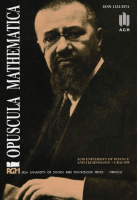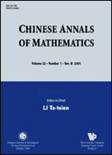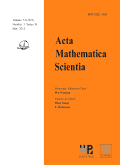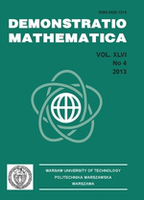
Ufa Mathematical Journal
Scope & Guideline
Exploring Innovative Methodologies in Mathematics
Introduction
Aims and Scopes
- Applied and Computational Mathematics:
The journal publishes research that applies mathematical theories to solve real-world problems, often utilizing computational techniques to analyze complex systems. - Functional Analysis and Operator Theory:
A significant focus is placed on functional analysis, particularly in relation to operators, including topics such as spectral theory and operator algebras. - Partial Differential Equations (PDEs):
The study of PDEs is a core area, with papers addressing both theoretical and practical aspects of various types of equations, including boundary value problems and stability analysis. - Mathematical Modeling and Dynamical Systems:
Research on mathematical models of dynamic systems is prevalent, exploring stability, control, and the behavior of nonlinear systems. - Inequalities and Approximation Theory:
The journal features contributions related to inequalities, approximation theory, and their applications in various mathematical contexts. - Fractional Calculus and Nonlocal Problems:
There is a growing interest in fractional calculus, particularly in its applications to nonlocal problems and equations involving fractional derivatives.
Trending and Emerging
- Fractional Differential Equations:
There is an increasing number of publications on fractional differential equations, highlighting their importance in modeling complex phenomena in various scientific fields. - Numerical Methods and Simulations:
Research focusing on numerical methods for solving differential equations and other mathematical problems is on the rise, indicating a growing emphasis on computational techniques in mathematics. - Stochastic Processes and Random Walks:
The exploration of stochastic processes, including random walks and their applications, is becoming more prevalent, reflecting a broader interest in probabilistic models and their implications. - Mathematical Biology and Biophysics:
Emerging interdisciplinary research at the interface of mathematics and biology is evident, with studies addressing mathematical modeling of biological systems and processes. - Complex Systems and Chaos Theory:
The journal is witnessing a trend towards research on complex systems and chaos theory, emphasizing the intricate behavior of nonlinear systems and their applications in various fields.
Declining or Waning
- Classical Algebra and Number Theory:
Research in classical algebra and number theory appears to be waning, with fewer papers addressing these traditional topics, possibly due to a shift towards more applied or computational areas. - Geometric Analysis:
There seems to be a decline in the number of publications related to geometric analysis, which may reflect evolving interests towards more abstract mathematical concepts or problems. - Historical and Foundational Studies in Mathematics:
Papers focusing on historical perspectives or foundational studies in mathematics have become less frequent, indicating a possible move towards more contemporary or applied mathematical research.
Similar Journals

Opuscula Mathematica
Championing Accessibility in Mathematical ResearchOpuscula Mathematica is an esteemed open-access journal published by AGH University of Science & Technology Press in Poland, specializing in the field of mathematics. Since its inception, it has provided a collaborative platform for researchers and scholars to share innovative mathematical insights and solutions, expanding its reach globally. With an impressive Q2 ranking in the realm of miscellaneous mathematics for 2023 and a notable Scopus ranking of Rank #139/399, it stands as a significant conduit for researchers seeking to publish high-quality, peer-reviewed articles. The journal has embraced open-access principles since 2004, ensuring that advancements in mathematical research are accessible to all. By publishing original research, reviews, and scholarly notes, Opuscula Mathematica plays a pivotal role in enhancing the visibility of vital mathematical discoveries and fostering academic discourse. Its convergence years from 2012 to 2024 highlight the journal's commitment to ongoing relevance and evolution in a dynamic research landscape.

CHINESE ANNALS OF MATHEMATICS SERIES B
Fostering Excellence in Applied Mathematics ResearchCHINESE ANNALS OF MATHEMATICS SERIES B, published by Shanghai Scientific Technology Literature Publishing House, is a prominent journal dedicated to fostering research and development in the field of mathematics. With an ISSN of 0252-9599 and an E-ISSN of 1860-6261, this journal provides a platform for the dissemination of innovative mathematical theories and methodologies. As of 2023, it is categorized within the Q4 quartile in *Applied Mathematics* and has achieved a commendable Q3 rank in *Mathematics (miscellaneous)*, emphasizing its growing influence in academia. Despite not being an open-access publication, it serves as a valuable resource for researchers, professionals, and students seeking to explore diverse mathematical topics, particularly from a unique regional perspective. The journal's extensive publication history—from 1980 and continuing to 2024—demonstrates a longstanding commitment to advancing mathematical knowledge and providing insights into various disciplines related to mathematics.

Moscow University Mathematics Bulletin
Celebrating Creativity and Rigor in Mathematical SciencesMoscow University Mathematics Bulletin is a distinguished academic journal published by Springer International Publishing AG, focusing on the dynamic field of mathematics. With an ISSN of 0027-1322 and an E-ISSN of 1934-8444, this journal serves as a platform for innovative research and developments in various mathematics sub-disciplines, making significant contributions to both theoretical and applied mathematics. While it holds a Q3 ranking in the field of Mathematics (miscellaneous) for 2023, this journal remains dedicated to fostering academic discourse among mathematicians. Researchers, professionals, and students will find value in the diverse range of articles that embody rigor and creativity. Although currently not an Open Access publication, the journal provides numerous access options through institutional or personal subscriptions. From its inception in 2007 to its expected continuity until 2024, the Moscow University Mathematics Bulletin is committed to enhancing the understanding and appreciation of mathematical sciences.

Kyungpook Mathematical Journal
Connecting Scholars Through Groundbreaking Mathematical DiscoveriesWelcome to the Kyungpook Mathematical Journal, a prominent publication dedicated to the advancement of mathematical research across various fields, including applied mathematics and miscellaneous mathematical disciplines. Published by the Department of Mathematics at Kyungpook National University in South Korea, this journal aims to disseminate high-quality original articles, fostering a deeper understanding and innovative applications of mathematical theories. With a distinguished Scopus ranking in its category, standing at Q3 in Applied Mathematics and Q3 in Mathematics (miscellaneous), it serves as a crucial platform for both emerging and renowned scholars to share their findings with a global audience. This publication is indexed in reliable databases, ensuring enhanced visibility and impact for its contributors. Even though it currently lacks open-access distribution, the journal remains an essential resource for researchers, professionals, and students looking to stay at the forefront of mathematical exploration from 2007 to 2024 and beyond. Join us in contributing to the vibrant discourse that shapes the future of mathematics.

Punjab University Journal of Mathematics
Advancing mathematical frontiers with rigorous research.Punjab University Journal of Mathematics is a prestigious academic journal published by the Department of Mathematics at the University of Punjab, Pakistan. Dedicated to advancing the field of mathematics, this journal provides a platform for researchers, educators, and students to disseminate their findings, foster scholarly dialogue, and promote innovative mathematical research. With a strong focus on theoretical and applied mathematics, the journal maintains a rigorous peer-review process to ensure high-quality publications that significantly contribute to the mathematical community. Although currently not indexed in prominent databases, the journal aims to elevate its visibility and impact through consistent publication of cutting-edge research. The absence of Open Access reflects a commitment to quality and thorough review, but researchers are encouraged to seek out this valuable resource for its insights and diverse contributions to mathematics.

SIBERIAN MATHEMATICAL JOURNAL
Unveiling Innovations in Mathematical ScienceThe Siberian Mathematical Journal is a prestigious academic publication dedicated to advancing the field of mathematics, particularly in the areas of theoretical and applied research. Published by the esteemed MAIK Nauka/Interperiodica/Springer, this journal has been a vital resource for mathematicians since its inception in 1966, with a commitment to disseminating high-quality research until 2024. Featuring an ISSN of 0037-4466 and E-ISSN 1573-9260, the journal is categorized in Q2 within miscellaneous areas of mathematics, showcasing its scholarly significance as evidenced by its Scopus rank of #257 out of 399 in General Mathematics. While it does not provide open access options, the Siberian Mathematical Journal is renowned for its rigorous peer-review process and a 35th percentile ranking, making it a crucial publication for researchers, professionals, and students who seek to stay abreast of the latest mathematical discoveries and methodologies.

ACTA MATHEMATICA SCIENTIA
Cultivating Excellence in Interdisciplinary ResearchACTA MATHEMATICA SCIENTIA is a reputable academic journal published by Springer, primarily focusing on the interdisciplinary fields of mathematics and physics. With an ISSN of 0252-9602 and an E-ISSN of 1572-9087, the journal has established itself as an influential platform for researchers and professionals seeking to disseminate novel findings in these domains. Based in the Netherlands, the journal holds a commendable Q2 category ranking in both Mathematics and Physics & Astronomy for 2023, reflecting its significance in the academic community. With a focus extending from 1996 to 2024, ACTA MATHEMATICA SCIENTIA serves as a vital resource for scholars, offering insights that bridge theoretical and applied sciences. Published under rigorous peer review, the journal fosters a robust scholarly dialogue and encourages innovative research that challenges existing paradigms. While access is not open, the journal's contributions are of paramount importance for advancing knowledge in the mathematical sciences and their applications in physical contexts.

Studia Universitatis Babes-Bolyai Mathematica
Elevating Research in the Realm of MathematicsStudia Universitatis Babes-Bolyai Mathematica is a prestigious journal published by UNIV BABES-BOLYAI in Romania, dedicated to advancing the field of mathematics and its diverse applications. With an ISSN of 0252-1938 and E-ISSN 2065-961X, this journal has carved out its niche in the Q3 category of miscellaneous mathematics as of 2023, ranking 315 out of 399 in the Scopus Mathematics General category, reflecting its commitment to quality and relevance in mathematical research. Covering a wide range of mathematical topics, it seeks to foster scholarly dialogue and innovation among researchers, practitioners, and students. Although it operates under a traditional access model, the journal remains a vital resource for the mathematical community, inviting submissions that contribute to theoretical advancements and practical applications. Established in 2016, Studia Universitatis Babes-Bolyai Mathematica is poised to remain a central platform for groundbreaking research through 2024 and beyond, making it an essential addition to the libraries of those engaged in mathematical study and discourse.

Mediterranean Journal of Mathematics
Elevating Research Standards in the Heart of the MediterraneanThe Mediterranean Journal of Mathematics, published by SPRINGER BASEL AG, is a prominent platform dedicated to the advancement of mathematical research and education. Since its inception in 2004, this journal has been pivotal in disseminating high-quality research across various fields of mathematics, currently holding a notable Q2 ranking in the miscellaneous mathematics category as of 2023. With its ISSN 1660-5446 and E-ISSN 1660-5454, the journal enjoys a respected position in the academic community, evident by its Scopus rank of 129 out of 399 in General Mathematics, placing it in the 67th percentile. While primarily a subscription-based journal, it remains committed to providing a comprehensive resource for researchers, professionals, and students, fostering dialogue and exploration within the mathematical sciences. The Mediterranean Journal of Mathematics, based in Basel, Switzerland, continues to contribute significantly to the evolution of mathematical theory and practice, marking its relevance as we approach its 20th anniversary in 2024.

Demonstratio Mathematica
Elevating the Standards of Mathematical InquiryDemonstratio Mathematica, published by DE GRUYTER POLAND SP Z O O, is an esteemed open-access journal in the field of mathematics, with an ISSN of 0420-1213 and E-ISSN 2391-4661. Established in 1996 and providing open access since 2009, it has become a vital platform for disseminating innovative research and advancements in various areas of mathematics. With a commendable Scopus ranking of 85/399 in General Mathematics and a 2023 Category Quartile of Q2, it stands at the forefront of the mathematical community, demonstrating a significant impact within the top 78th percentile. The journal aims to foster a deeper understanding and appreciation of mathematical concepts and their applications, catering to both seasoned researchers and emerging scholars. Located in Warsaw, Poland, Demonstratio Mathematica not only enriches the academic discourse but also strengthens collaborative efforts within the international mathematics community, making it an essential resource for those seeking to expand their knowledge and research output.